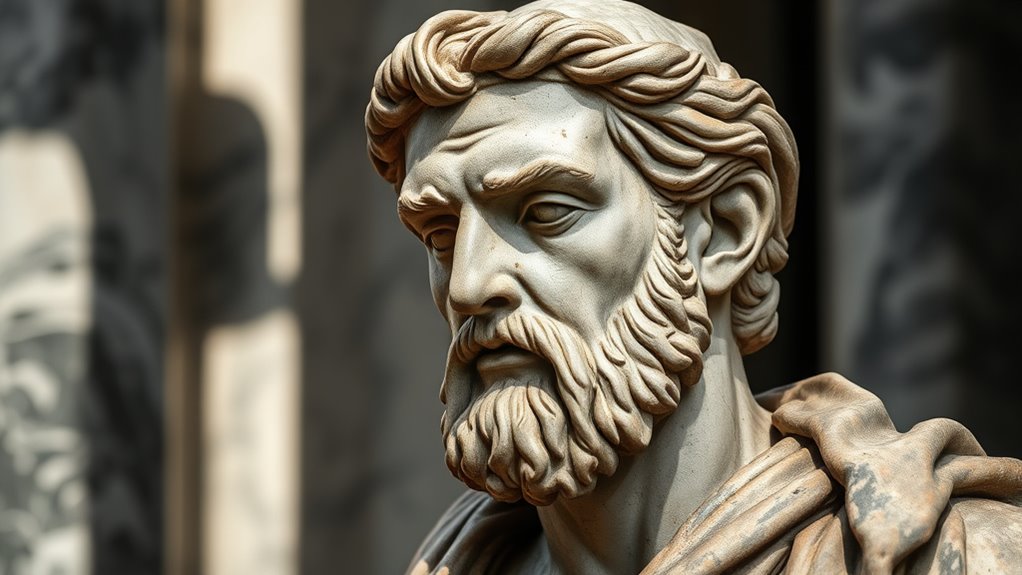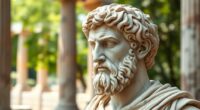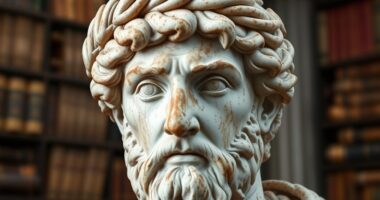To uncover the wisdom of the Roman Stoic master Gaius Musonius Rufus, focus on his teachings about virtue, resilience, and self-discipline. He emphasized that true strength comes from inner resilience, habits, and controlling reactions to external circumstances. By adopting his principles, you’ll learn how to live with morality, patience, and calmness regardless of life’s challenges. Continue exploring, and you’ll discover how his timeless insights can guide your modern journey toward inner peace.
Key Takeaways
- Gaius Musonius Rufus emphasized virtue through discipline, resilience, and habitual practice, shaping Stoic moral development.
- His teachings highlight inner resilience over external wealth, promoting self-control and moral integrity.
- Mentoring students like Epictetus, he advanced Stoic principles on emotional intelligence and practical philosophy.
- His legacy underscores managing external circumstances with equanimity, viewing challenges as opportunities for growth.
- Modern applications draw from his focus on self-discipline, mindfulness, and ethical living amidst life’s complexities.
The Life and Legacy of Gaius Musonius Rufus
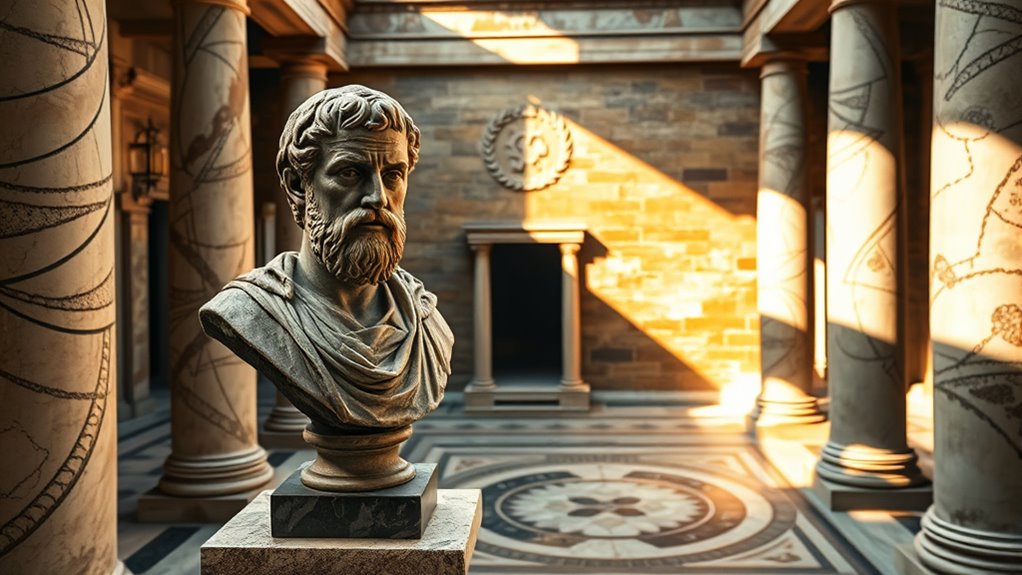
Gaius Musonius Rufus, a prominent Stoic philosopher of the 1st century CE, dedicated his life to practicing and teaching virtue through discipline and resilience. In the historical context of Roman society, he challenged luxury and superficiality, emphasizing self-control. During philosophical debates, he argued that true virtue arises from habitual practice and inner resilience, not external wealth. Despite exile and societal opposition, he remained committed to Stoic ideals, mentoring students like Epictetus. His legacy endures through his teachings on morality, resilience, and practical philosophy, influencing later Roman Stoics and shaping the tradition’s emphasis on virtue as a way of life. His emphasis on personal discipline exemplifies the core Stoic pursuit of virtue through consistent effort.
Core Principles of Stoic Practice

At the heart of Stoic practice lies the emphasis on habitual virtue—understanding that consistent actions shape your character more than theoretical knowledge alone. Developing emotional intelligence helps you recognize and manage your feelings, fostering inner resilience. Environmental ethics remind you to respect nature’s role and practice moderation, avoiding excess that harms the environment. By controlling your reactions and aligning daily habits with virtue, you cultivate self-discipline and moral integrity. This focus on internal consistency ensures that virtues like justice, temperance, and courage become ingrained, enabling you to face life’s challenges with calm, clarity, and a commitment to both personal growth and the well-being of the world around you. Recognizing the importance of cookie categories helps in understanding how external influences can be managed to support your mental clarity and focus.
The Practical Philosophy of Self-Discipline
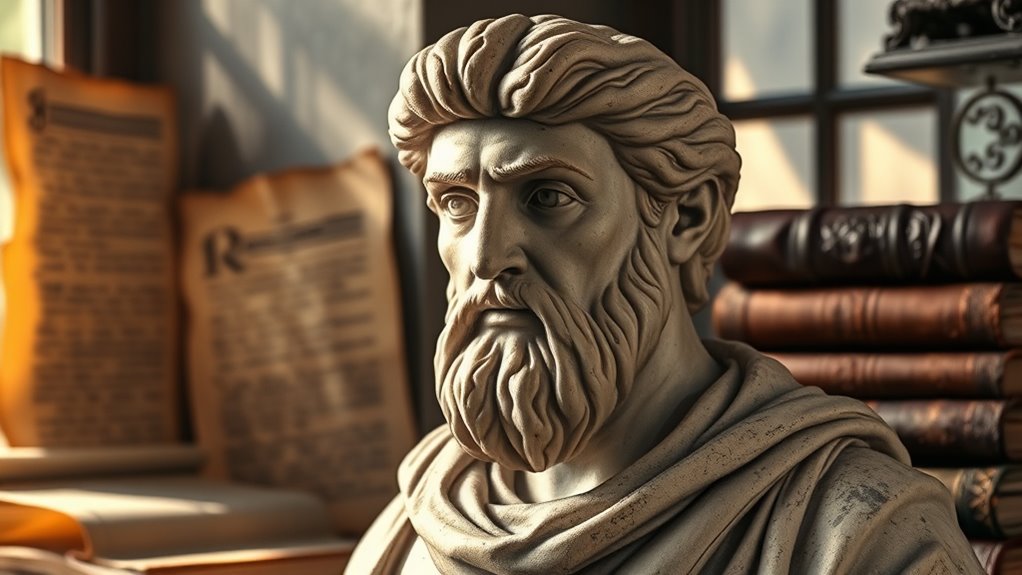
Self-discipline is the foundation of practicing Stoic philosophy, guiding you to align your actions with virtue rather than fleeting desires. Ancient rituals and philosophical debates helped reinforce this discipline, emphasizing consistent practice over time. You learn to control impulses through daily habits, resisting luxury and indulgence. By engaging in self-reflection and applying precepts like Premeditatio Malorum, you prepare for life’s challenges. This rigorous mental training cultivates resilience, internal strength, and moral integrity. Self-discipline isn’t about perfection but persistent effort. It’s a practical tool to develop inner freedom, allowing you to remain steady amid external chaos and distractions. Developing mental resilience through disciplined routines further solidifies this inner strength. Recognizing signs of spoilage in your habits ensures your efforts remain effective and pure, strengthening your moral character. Incorporating awareness of potential pitfalls in new technologies can help maintain discipline in adapting to change. Additionally, understanding the importance of consistent practice in virtues helps sustain this discipline over the long term. Understanding the psychological mechanisms behind self-control can also enhance your ability to maintain discipline in the face of temptation.
Attitudes Toward Wealth and Material Possessions
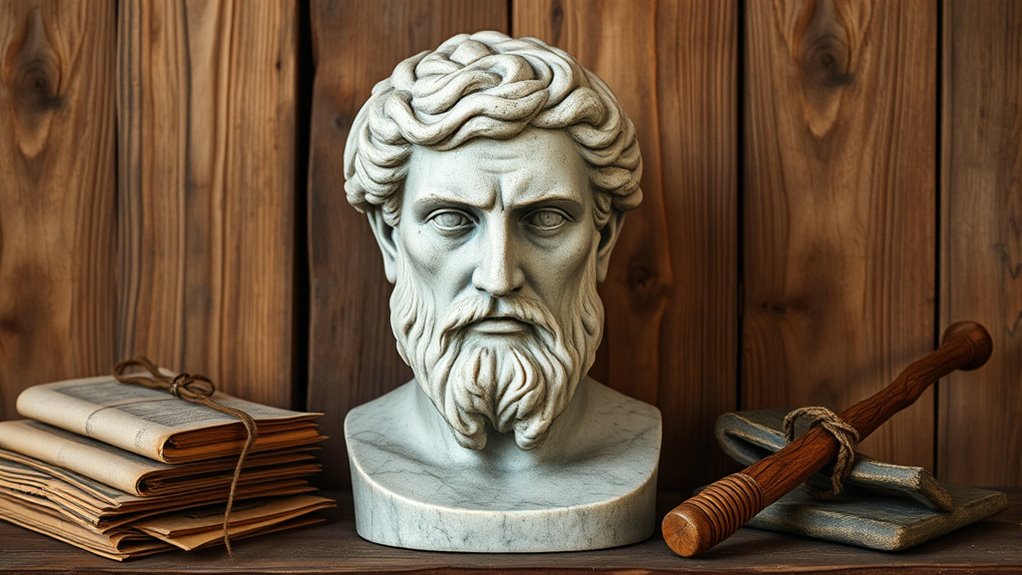
We often equate wealth and material possessions with security and happiness, but Stoic philosophy challenges this view by emphasizing their fleeting nature and limited true value. You’re encouraged to practice wealth indifference, understanding that external riches don’t define virtue. A luxury critique highlights how superficial displays distract from inner growth. Visualize this:
| Material Wealth | Inner Virtue |
|---|---|
| Gilded rooms | Calm mind |
| Precious stones | Moral integrity |
| Extravagance | Self-control |
Additionally, cultivating creative practice can help shift focus from external possessions to internal virtues. Recognizing the importance of inner harmony reinforces the idea that true fulfillment comes from within rather than material accumulation. Developing cultural intelligence can further enhance one’s understanding of different values and perspectives, aligning with Stoic ideals of wisdom and self-awareness. Engaging in mindful reflection fosters a deeper appreciation for what truly matters beyond superficial appearances. In the realm of Catering and Delivery, prioritizing quality and service over flashy presentation mirrors this philosophy, emphasizing substance over superficiality.
Exile as an Opportunity for Inner Growth
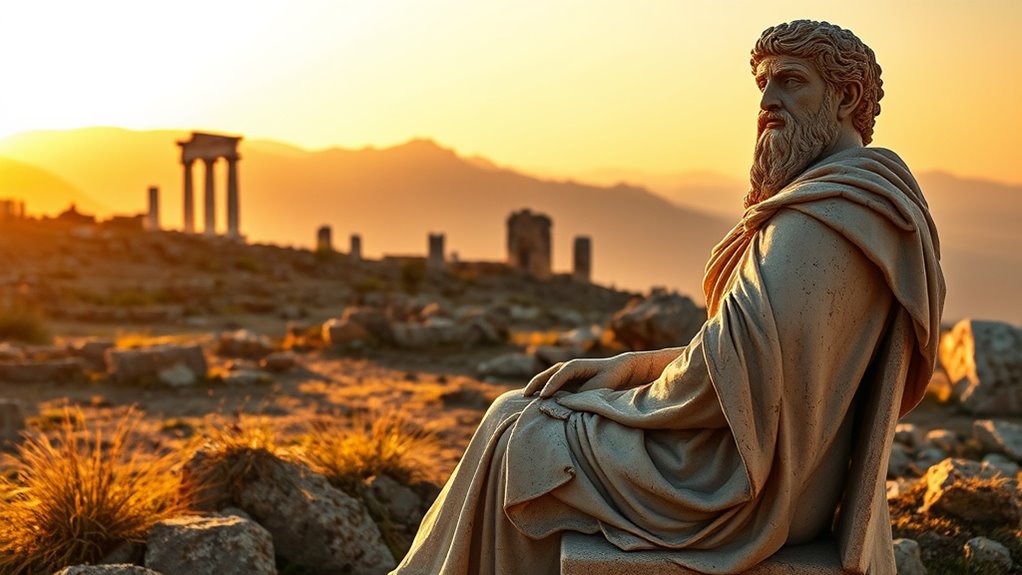
Exile, often seen as a harsh punishment or obstacle, can actually serve as a powerful opportunity for inner growth when approached with the right mindset. Instead of dwelling on loss or wealth accumulation, view exile as a chance to practice virtue and deepen your self-discipline. Avoid luxury and superficial comforts, focusing instead on internal resilience and moral integrity. Use this time to reflect, cultivate patience, and reinforce your commitment to Stoic principles. Exile strips away external distractions, revealing what truly matters—your character and virtue. Recognizing that external circumstances are beyond our control and focusing on internal resilience can help you maintain a steady mind. Embracing AI vulnerabilities and challenges like exile can strengthen your ability to remain steadfast and resilient. Cultivating a growth mindset allows you to see adversity as an opportunity for learning and development. Understanding the importance of educational toys for early development can remind us that growth often stems from unexpected challenges. Know that facing adversity with a calm mind is a key aspect of Stoic philosophy, which emphasizes resilience and virtue. Embrace the challenge as a path to inner strength, knowing that true growth comes from within, not external circumstances.
Mentorship and Influence on Future Thinkers
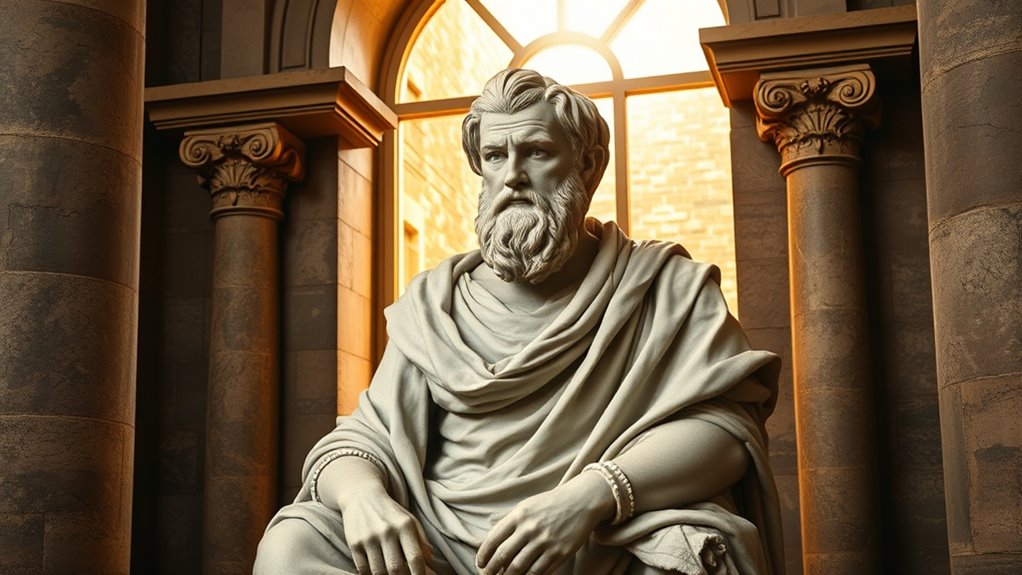
Gaius Musonius Rufus’s role as a mentor profoundly shaped the development of Stoic thought, influencing a generation of future philosophers who carried his teachings forward. He emphasized practical philosophy rooted in ancient rituals of discipline and virtue, often referencing mythic origins to inspire moral resilience. His mentorship inspired students like Epictetus and Marcus Aurelius, who internalized his lessons on self-control and indifference to external goods. Musonius’s influence extended beyond theory, encouraging disciplined practice to cultivate internal strength. His legacy persists through the principles he instilled, demonstrating how mentorship can transform philosophical ideals into enduring ethical habits. Moreover, his emphasis on innovative materials in daily practice underscores the importance of adapting ancient wisdom to modern contexts, ensuring the resilience of Stoic principles across eras. Additionally, fostering a growth mindset among students was central to his teaching, enabling them to approach challenges with resilience and adaptability. Recognizing the importance of mentorship, he actively cultivated relationships that promoted continuous learning and personal development among his students. Furthermore, his teachings highlight the significance of consistent discipline as a means to achieve moral and philosophical excellence. By integrating Cultural Intelligence principles, he effectively tailored his mentorship to diverse audiences, enhancing their understanding and application of Stoic virtues.
The Role of Virtue in Daily Life
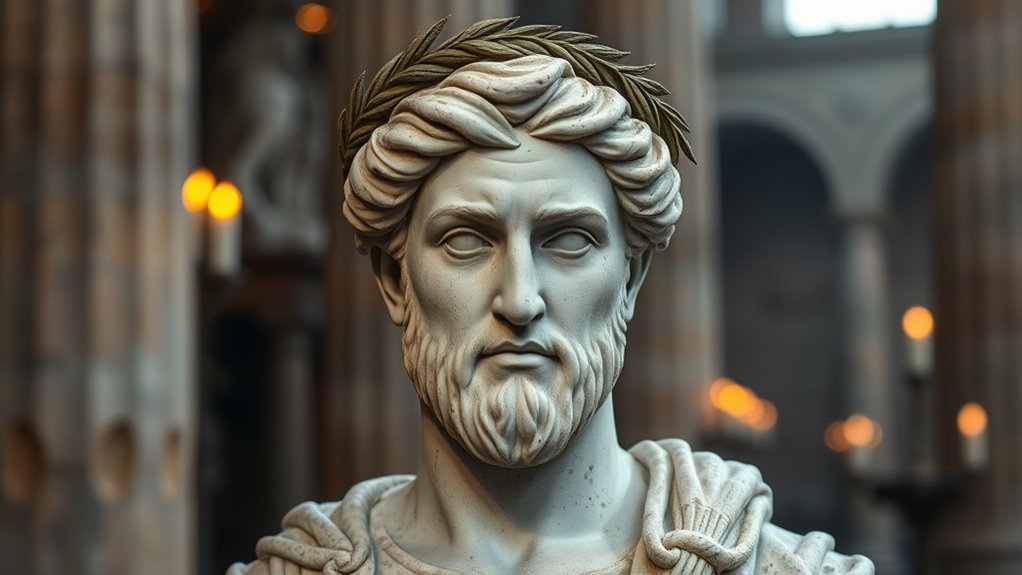
Virtue is the foundation of daily life for anyone committed to Stoic principles; it guides your actions, shapes your character, and determines your inner peace. By practicing virtue consistently, you develop emotional resilience, allowing you to face challenges calmly and with clarity. Your daily routines should focus on self-discipline, reflection, and acting with justice, temperance, and prudence. When you prioritize virtue over external possessions or pleasure, you cultivate inner strength that withstands life’s setbacks. This ongoing commitment transforms ordinary moments into opportunities for moral growth, reinforcing your character and helping you stay aligned with Stoic ideals in every aspect of life. Additionally, understanding the importance of enhanced natural language processing can deepen your comprehension of human behavior and emotional responses, further supporting your pursuit of virtuous living. Cultivating awareness of emotional responses enables you to respond more thoughtfully and compassionately to others, fostering a community grounded in kindness.
Cultivating Resilience and Inner Strength
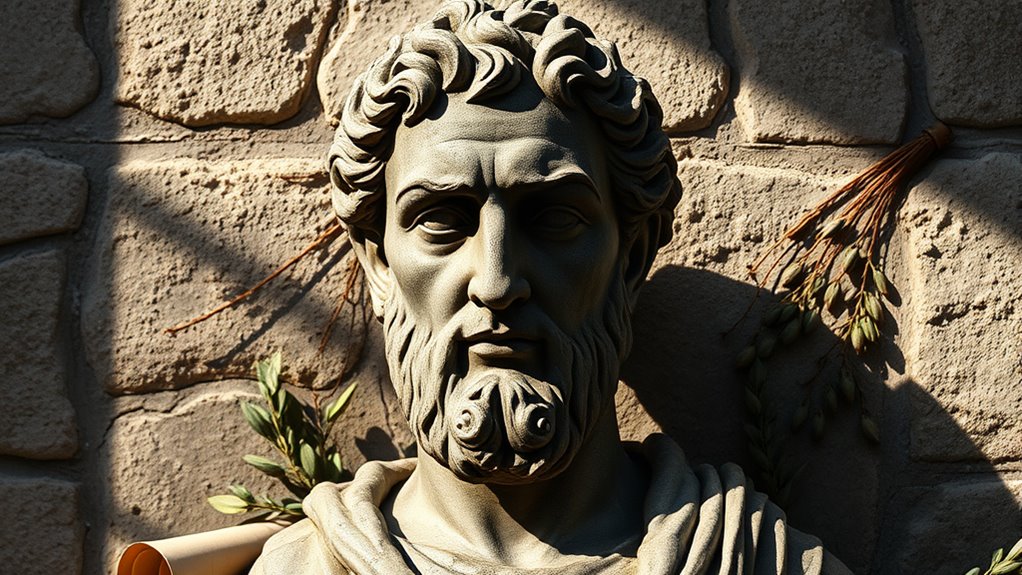
To truly cultivate resilience and inner strength, you must focus on developing your ability to remain steady amid life’s inevitable challenges. Practicing mindfulness techniques helps you stay present and avoid being overwhelmed by emotions. By consciously regulating your emotional responses, you build internal stability that withstands setbacks. Embrace difficulties as opportunities to strengthen your character, viewing obstacles through a Stoic lens. Cultivating resilience isn’t about avoiding hardship but mastering your mind to face it with calm and clarity. Over time, this internal discipline nurtures unwavering resilience, allowing you to maintain virtue and purpose regardless of external circumstances.
Stoic Perspectives on External Circumstances
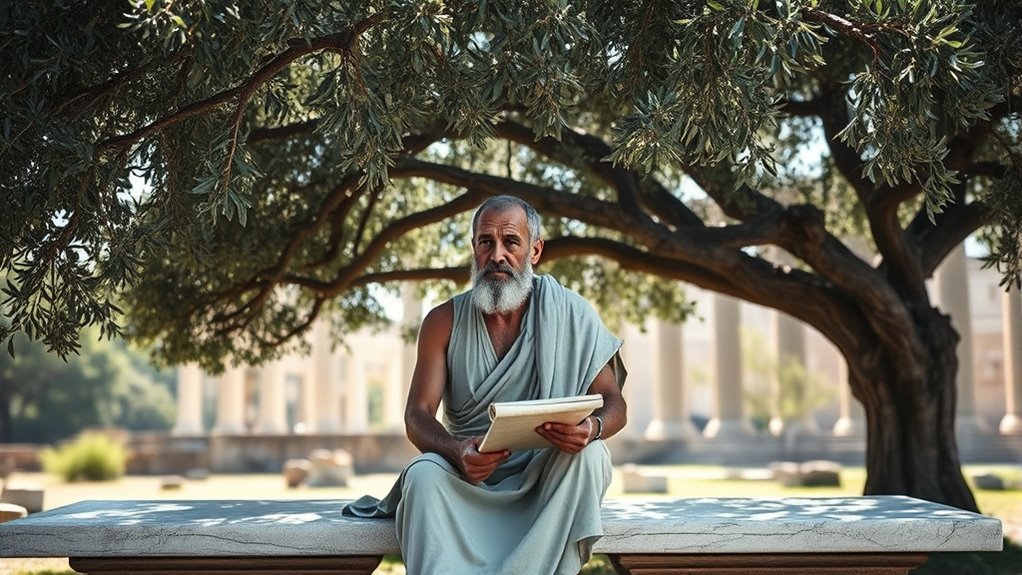
External circumstances, from fortune and exile to social status, hold little sway over a Stoic’s inner peace because they are beyond our control. You recognize that political engagement or artistic expression can influence external events, but true virtue depends on your response. Instead of being swayed by luck or societal shifts, focus on cultivating resilience and maintaining inner harmony. By practicing indifference to external gains or losses, you preserve your moral integrity. This mindset allows you to act virtuously regardless of circumstances, understanding that your happiness and character are rooted within, not in the unpredictable world around you.
Timeless Lessons for Modern Living
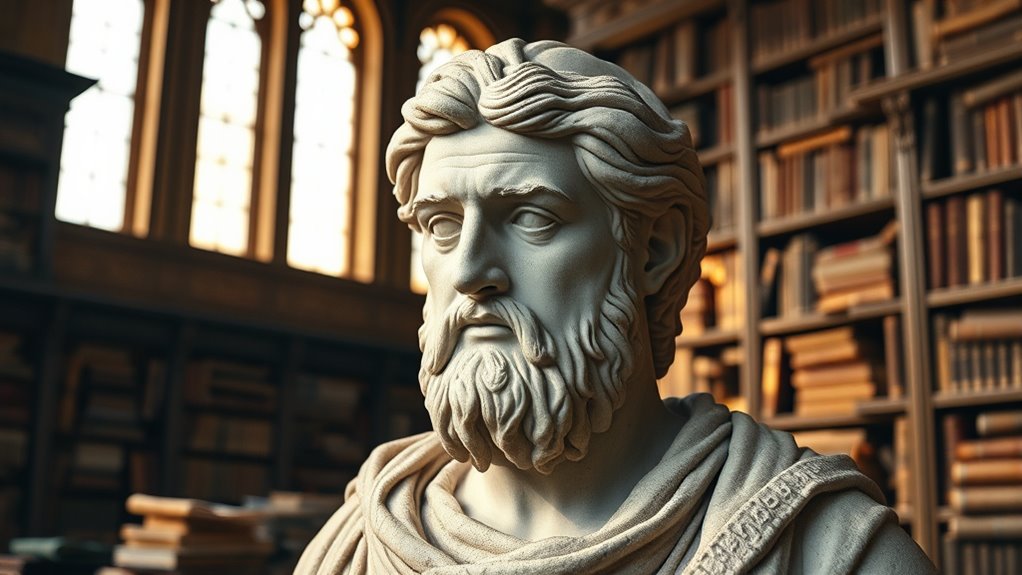
The timeless wisdom of Stoicism offers practical guidance for steering the complexities of modern life. By embracing ancient rituals and artistic expressions, you can cultivate resilience and inner peace. These practices remind you to focus on what you can control, reject superficial wealth, and find contentment in virtue. Incorporate daily reflection, meditation, or acts of kindness to build habits aligned with Stoic principles. Here’s a quick guide:
| Rituals | Artistic Expressions | Modern Applications |
|---|---|---|
| Morning reflection | Writing poetry | Journaling emotions |
| Gratitude exercises | Painting your feelings | Mindfulness meditation |
| Self-discipline | Sculpting your character | Setting clear boundaries |
| Acceptance rituals | Music for calm | Practicing patience |
| Review of actions | Storytelling | Ethical decision-making |
Frequently Asked Questions
How Did Musonius Rufus’s Exile Influence His Philosophical Outlook?
Your question about Musonius Rufus’s exile reveals how it shaped his philosophy. His exile strengthened his resilience, showing him that external circumstances don’t define virtue. It prompted a philosophical transformation, emphasizing acceptance and inner strength. Instead of seeing exile as a setback, he viewed it as an opportunity to deepen his virtues, proving that true resilience comes from within and that hardship can be a catalyst for personal and philosophical growth.
What Specific Practices Did Musonius Recommend for Cultivating Virtue Daily?
You should practice daily reflection and virtue journaling to cultivate virtue, as Musonius Rufus emphasized consistent habits. Each day, reflect on your actions, aiming to improve your moral integrity. Write about your efforts to embody courage, temperance, and justice, and assess where you can grow. By making these practices routine, you develop internal resilience, strengthen your character, and align your life with Stoic principles of virtue and self-discipline.
How Did Musonius’S Teachings Differ From Other Stoic Philosophers of His Time?
You’ll notice Musonius’s teachings differ from other Stoics because he emphasized practical application and ethical discipline more than abstract theory. He prioritized developing personal resilience through daily habits and self-control, stressing that virtue is cultivated through consistent practice. Unlike some Stoics who focused on detachment from the world, Musonius promoted active engagement in meaningful deeds, making ethics a lived experience rooted in personal resilience.
In What Ways Did Musonius Challenge Societal Views on Luxury and Wealth?
You see, Musonius challenges society’s views on luxury and wealth by critiquing excessive indulgence and emphasizing wealth moderation. He advocates that true virtue isn’t found in material possessions or outward displays of wealth but in cultivating inner resilience and moral integrity. Instead of pursuing luxury for pleasure, he urges focusing on meaningful deeds and self-sufficiency, promoting a lifestyle that values health, virtue, and mental discipline over superficial riches.
How Can Musonius’s Principles Be Applied to Modern Personal Development?
To apply Musonius’s principles today, you focus on mindfulness meditation and goal setting, practicing discipline and self-awareness. Cultivate inner resilience and moral integrity through daily reflection, just as he advocated for habitual virtue. Embrace simplicity and contentment, prioritize meaningful deeds over material gains, and develop patience and prudence. By aligning your actions with your values, you grow stronger internally, transforming your life through consistent effort and unwavering commitment.
Conclusion
Embracing the wisdom of Gaius Musonius Rufus, you realize that virtue is your true anchor amid life’s storms. Like a steady lighthouse guiding ships through darkness, his teachings illuminate the path to resilience and moral excellence. By practicing self-discipline and accepting life’s challenges, you craft a resilient soul that shines regardless of external circumstances. Let his timeless insights be the compass that steers your journey toward inner peace and enduring virtue.
